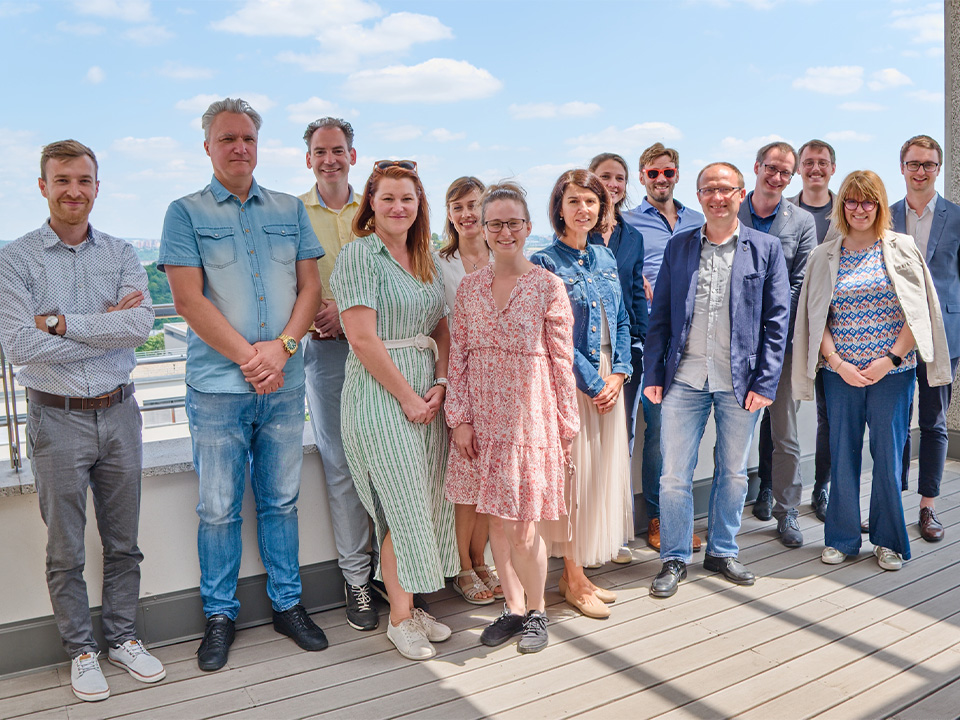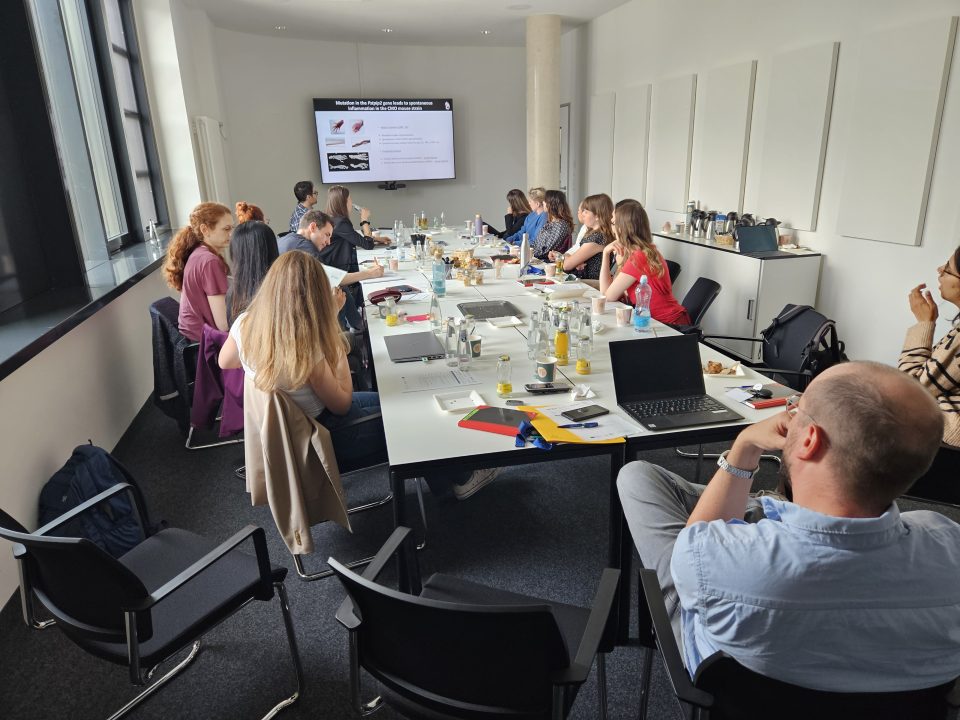The world’s top scientific meeting has traditionally been dedicated to current cancer research findings, advances in clinical oncology, and evidence-based cancer prevention. Among the active participants were also scientists and researchers of the National Institute for Cancer Research (NICR). In addition to the latest findings from research on cancer biology and the tumour microenvironment, attention was also paid to shared risks between cancer, cardiovascular and metabolic diseases and artificial intelligence models and their use in the analysis of large datasets.
Around 7,000 abstracts and 3,000 posters offered at least a glimpse into the future of cancer research and beyond. “In San Diego, there was also a lot of talk about the need to communicate science and its results to the public – and we could see how important this communication is with the recent COVID-19 pandemic,” said Peter Vanek from the Cancer Research Foundation of the Czech Republic and the Institute of Molecular and Translational Medicine at the Faculty of Medicine of the University of Olomouc.
Nearly 730 invited speakers, including 10 “NextGen Stars”, young emerging scientists who were successful in the selection process, spoke in front of more than 23,200 registered participants from 78 countries during this year’s AACR Annual Meeting. More than 240 clinical trials were also presented, the most in the history of AACR Annual Meetings, including 24 Phase 3 studies, many of which have the potential to change the current paradigm of cancer treatment. The scientific community was also active on social media during the AACR Annual Meeting, with more than 28,000 posts shared on X alone with the hashtag #AACR24 and a record 571 million insights.
Among the accepted abstracts and posters in the program, we counted about two dozen scientific papers from the Czech Republic. Many of them came from departments belonging to the NICR family, including three posters in the Late-Breaking Research section.
Overview of selected papers presented during AACR 2024, in which researchers from institutions involved in the NÚVR participated
- Abstract LB111: CORSA study – Telomere length measurement of 5371 Austrian colorectal cancer and adenoma patients and healthy controls: Relationships to tumor stage, course of disease and to clinical, life style and health parameters Petr Hanak, Michal Kroupa, Uttarilli Anusha, Ludmila Vodickova, Andrea Gsur, Stefanie Brezina, Pavel Vodicka
- Abstract LB096: Telomere length as a predictor of therapy response and survival in patients diagnosed with ovarian carcinoma Kristyna Tomasova,Karolina Seborova, Michal Kroupa, Josef Horak, Ludmila Vodickova, Lukas Rob, Martin Hruda, Marcela Mrhalova, Alena Bartakova, Jiri Bouda, Thomas Fleischer, Vessela Kristensen, Pavel Vodicka, Radka Vaclavikova
- Abstract LB206: The progression of chromosomal instability and aberrant DNA methylation during colorectal cancer development Katerina Saskova, Mattias Landfors, Josef Horak, Katerina Honkova, Kristyna Tomasova, Jana Drabova, Fernanda Schäfer Hackenhaar, Jitka Pavlikova, Ludmila Vodickova, Torbjörn Nilsson, Sanja Farkas, Veronika Vymetalkova, Pavel Vodicka, Sofie Degerman, Michal Kroupa
- Abstract 7191: Targeting IGF1R/INSR pathway with approved ALK inhibitors inhibits AKT signaling and overcomes proteasome inhibitor resistance in multiple myeloma Andrej Besse, Tiberiu Totu, Marianne Kraus, Anthonius P. Janssen, Jana Veprkova, Max Mendez Lopez, Ondrej Slaby, Marija Buljan, Mario van der Stelt, Christoph Driessen, Lenka Besse
- Abstract 389: The role of endoplasmic reticulum stress in immune surveillance and effectiveness of immunotherapy in renal and ovarian carcinoma Marek Svoboda, Lukas Moran, Barbora Vavrusakova, Lenka Krejci, Kamila Souckova, Katerina Vasickova, Milos Holanek
- Abstract 4583: Development of selective HDAC6 inhibitors to improve cancer immunotherapy Nithya Gajendran, Manasa Suresh, David Quiceno, Xintang Li, Marie Durr, Sebastian J. Marquez Rodriguez, Mario A. Noboa, Sruthi Mohan, Barbora Havlinov, Julia Kudlacova, Satish Kumar Reddy Noonepalle, Cyril Barinka, Duncan J. Wardrop, Alejandro Villagra
- Abstract 7496: The piritramide-based perioperative analgesia can affect the cancer dissemination in colorectal cancer patients Josef Srovnal, Emil Berta, Monika Vidlarova, Alona Rehulkova, Katerina Jecmenova, Miroslav Popper, Alzbeta Srovnalova, Petr Prasil, Pavel Skalicky, Tomas Gabrhelik, Jan Maca, Pavel Michalek, Marian Hajduch
- Abstract 7414: Claire: a search engine leveraging deep databases for reliable detection of peptides, with a special focus on proteogenomic applications Miroslav Hruska, Petr Dzubak, Marian Hajduch
- Abstract 7142: Optimizing estradiol dimers through linker design: Enhancing anticancer efficacy by targeting microtubule dynamics Petr Dzubak, Michal Jurasek, Jiri Rehulka, Sona Gurska, Pavel Polishchuk, Pavel Draber, Lukas Huml, Pavel B. Drasar, Alexandra Ivanova, Olena Mokshyna, Lenka Hruba, Marian Hajduch
- Abstract 5788: Targeting p97-NPL4 pathway by copper chelators Martin Mistrik, Zdenek Skrott, Martin Loffelmann
- Abstract 460: Fecal microRNA and microbiome profiles in colorectal cancer patients: Are they predictor of survival and how do behave in longitudinal samples Barbara Pardini, Nazim Arda Keles, Giulio Ferrero, Sonia Tarallo, Giulia Francescato, Amedeo Gagliardi, Virginia Alberini, Carla Di Battista, Veronika Vymetalkova, Fatma Turkoglu, Ozgul Duzgun, Omer Faruk Ozkan, Bilge Guvenc Tuna, Pavel Vodicka, Soner Dogan, Alessio Naccarati
- Abstract 5528: Adaptive immune cells in colorectal cancer between normal mucosa, primary tumor and liver metastasis Andriy Trailin, Wenjing Ye, Esraa Ali, Sergii Pavlov, Lenka Cervenkova, Filip Ambrozkiewicz, Ondrej Vycital, Ondrej Daum, Vaclav Liska, Kari Hemminki
Photo: Denisa Pavelková, IMTM





